 Leading Blog | Posts by Month |
 Leading Blog | Posts by Month |
06.30.24

LeadershipNow 140: June 2024 Compilation
See more on
Posted by Michael McKinney at 10:35 AM
06.27.24

Leading Thoughts for June 27, 2024
IDEAS shared have the power to expand perspectives, change thinking, and move lives. Here are two ideas for the curious mind to engage with: Professor L.A. Paul on how to think about important life choices: “As we live our lives, we find ourselves confronted with a brute fact about how little we can know about our futures—just when it is most important to us that we do know. For many big life choices, we only learn what we need to know after we’ve done it, and we change ourselves in the process of doing it. I’ll argue that, in the end, the best response to this situation is to choose based on whether we want to discover who we’ll become.” Source: Transformative Experience Lee Kuan Yew on leadership: “The task of the leaders must be to provide or create for them a strong framework within which they can learn, work hard, be productive and be rewarded accordingly. And this is not easy to achieve.” Source: The Singapore Story: Memoirs of Lee Kuan Yew Look for these ideas every Thursday on the Leading Blog. Find more ideas on the LeadingThoughts index.
Posted by Michael McKinney at 09:07 AM
06.26.24

No Matter What Work You Do, You Have a Customer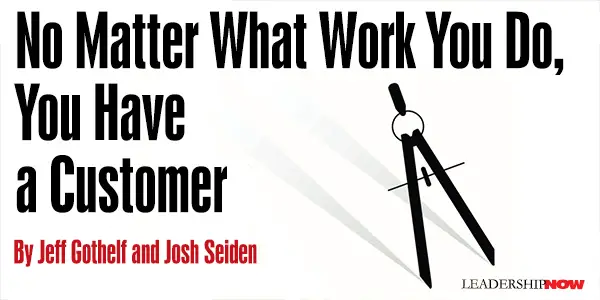
IF SOMEONE was to ask you who is your customer, you would probably easily answer the question. Regardless of what you do at work you probably know who buys the product or service your company makes. Now, if that same someone were to ask you who consumes the work that you personally do, the answer may not come as easily. In a lot of cases, the person who uses what you make isn’t the end customer of your company. It’s likely to be someone who works for your company. What would change if you began to think of that person as your customer? It’s a question most people never consider. How does the work I do make my colleagues more or less successful? It becomes particularly challenging for people working outside of any product development roles. If you work in finance, who uses that spreadsheet you create? What about the legal team? They create policies. How well do those policies enable the work of those who have to follow them? In other words, how well does your work “work?” Making your customers successful defines the value of your work. The simplest way to know if you’ve done that is to see (and measure) how their behavior changes once you’ve delivered your work. Did your spreadsheet reduce or increase the number of questions asked about the budget? Did the procurement policy you implemented decrease or increase vendor onboarding time? These are the true measures of success and value. The act of “making a thing” is just the beginning of the conversation. This is a radical concept. For decades, we’ve been measured by whether or not we “made a thing” or even just completed a task. No one ever asked us if the “thing” we made or the task we completed actually made someone else more successful. The behavior change someone exhibits after using a thing we’ve made is called an outcome. An outcome is a measurable change in human behavior that delivers business results. Outcomes are the fundamental building blocks of objectives and key results (OKRs) — a resurgent, team-focused, goal-setting framework used to redefine success away from the creation of a thing (output) and towards a meaningful change in human behavior (outcome). Imagine you’re a shoe designer. Your work isn’t consumed by the buyers of your company’s shoes. Rather, it’s consumed by materials buyers, merchandisers, marketing and advertising teams, as well as the finance department — not to mention the fabricators of the shoes. Maybe you deliver your designs in the form of a 3D rendering. Maybe you deliver it as a video, or maybe just as a simple PowerPoint presentation. Which delivery channel is best? How do you know? The truth is, you don’t. And that’s the frustratingly ineffective aspect of only considering output alone. You’re guessing. You don’t know exactly what the best way to deliver this information is and which details to include. The most effective way to tell if you’re creating value is to see how people behave. For our shoe designer, the key results that indicate they’ve delivered value include behaviors like “the number of clarifying questions asked after a shoe design is delivered” or “the time it takes to go from design to manufacturing.” These are measures of human behavior. They tell you when you’ve delivered something of value and in a valuable way. They tell you that you’ve made your internal customers successful. When you wrap these key results in a human-centric objective — the benefit these people will get from your work — you set goals that give you a much better sense of the quality of your work and how you might improve it. The shoe designer may put together an objective and key results statement that looks something like this: Objective: Make it dead simple for my colleagues, regardless of department, to do their job from my shoe designs. Key Result: Reduce the number of clarifying questions asked about each design by 90 percent. Key Result: Reduce the time it takes to go from delivered design to manufacturing by 50 percent. Stating goals this way provides the shoe designer with the opportunity to try different ways of delivering their design and assessing which way is best. It makes them a better shoe designer exactly because they’re focusing on their internal colleagues as customers. Use these tips for using OKRs to benefit your internal customers: 1. Think beyond the work that you do. How does what you do enable the next person in line to do their job? Are you making that easier or harder for them with what you’re creating? 2. Talk to your colleagues. Understand how they do their work and what makes it easier and more difficult. Get to know their obstacles. Perhaps there are ways you can help them overcome them. 3. Work with them to determine successful behaviors. How do they define it? Everyone has a customer. It just might not be who you thought. Ask yourself who uses what you make. How do their behaviors indicate that you’ve delivered value to them? Then, write an OKR to redefine your team’s goals and see how that changes the work you produce.  
Posted by Michael McKinney at 01:04 PM
06.22.24

Tom Brady: To Be Successful at Anything, You Don’t Have to Be Special 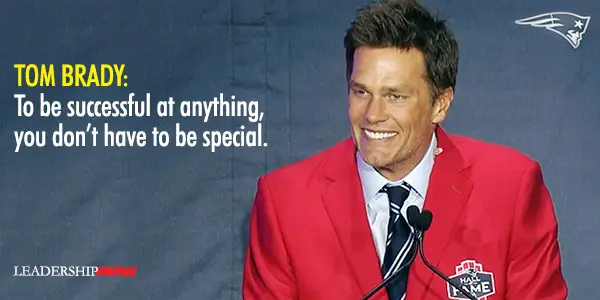
Last Wednesday, June 12, in front of almost 60,000 people, the greatest quarterback of all time, Tom Brady, was inducted into the New England Patriots Hall of Fame. In an outstanding, emotional 20-minute acceptance speech, he reflected on football and life. Here are some of his key thoughts that apply to us all. It’s hard to throw, catch, block and tackle and hit kids when they’re way bigger and way more developed than you, only to go home that night bruised and battered and strained, but knowing that you have to show up again the next day for just the chance to try again. But understand this: life is hard.
Posted by Michael McKinney at 09:47 PM
06.21.24

10 Books You Should Read This Summer 2024
SUMMER is here. The summer is a perfect time to explore new ideas and perspectives to challenge your thinking and expand your potential. Create a summer reading plan. Try a book you usually don’t pick up. Wally Bock offers his advice on this here. Here are ten suggestions for books released this year to inspire you and help grow your leadership.
Come inside a jury room as one juror leads a starkly divided room to consensus. Join a young CIA officer as he recruits a reluctant foreign agent. And sit with an accomplished surgeon as he tries, and fails, to convince yet another cancer patient to opt for the less risky course of treatment. In Supercommunicators, Charles Duhigg blends deep research and his trademark storytelling skills to show how we can all learn to identify and leverage the hidden layers that lurk beneath every conversation. (Blog Post)
In Possible, Ury argues conflict is natural. In fact, we need more conflict, not less—if we are to grow, change, evolve and solve our problems creatively. While we may not be able to end conflict, we can transform it—unleashing new, unexpected possibilities. With this groundbreaking book, international negotiator William Ury shares a new “path to possible”—time-tested practices that will help readers unlock their power to constructively engage and transform conflict. (Blog Post)
When you put learning at the center of everything you do, you grow your career, your leadership, your relationships, and your joy and fulfillment in life. But even for people who are naturally curious and interested in solving problems, being an effective learner who can turn their learning into action takes insight and practice. David Novak shows you how to master active learning. This compilation of wisdom and practical habits from Novak's life and from some of the most successful leaders in the world—CEOs from many industries, military and political leaders, sports greats, experts, and coaches—is your active-learning practice manual.
Inspired by venture capitalists’ unique way of thinking, The Venture Mindset offers a transformative playbook for delivering results in a rapidly changing world from a top Stanford professor and a technology executive. Venture capitalists are known for their extraordinary ability to spot opportunities. They know how to identify emerging trends, how to bring new industries into being, and when to hold them and when to fold. Their unique mindset has made them the force behind world-changing companies such as Amazon, Google, Moderna, SpaceX, and Zoom. Combining their insight and extensive experience, they present nine distinct principles that will help you make better decisions, transform your business, and achieve remarkable results, no matter your industry. (Blog Post)
A radical set of new ideas for how entrepreneurs, investors, and corporate leaders can use the pattern-breaking mindset to dominate the future. Pattern-breaking success, the authors, demands a different mindset and actions to harness developments others miss or that may, at first, seem crazy. Pattern Breakers is filled with firsthand storytelling about initial interactions with some of the most transformative start-ups of recent times. Maples and Ziebelman vividly illustrate an unexpected world where chaos is welcome, naysayers are a positive signal, movements galvanize believers—but one that ultimately change the future. They challenge us to rethink how to transcend the ordinary and achieve the extraordinary.
The Way of The Champion is the synthesis of everything Paul Rabil learned on his path to becoming one of the greatest lacrosse players of all time. But this is not merely a sports book. It is a guide to embodying a champion's mindset—in sports, in business, and in relationships. According to Rabil, “No one is born to be a champion. It can only be earned—through equal parts philosophy, execution, and sheer determination. I've won and lost championships, business deals, and relationships. I've learned that our best moments come after we've faced our most devestating defeats—when we choose to rise with unwavering resolve. That's the way of the champion."
John C. Maxwell, tackles the problem of our divided world in his latest book High Road Leadership. “Today it is causing people to fall—into disputes, frustration, anger, and despair. His solution is to expose the problems of taking the low and middle roads when interacting with others and teach people how to instead take the high road. Leaders who practice high road leadership value all people, do the right things for the right reasons, take accountability for their actions, and place people above their own agenda. Maxwell teaches the principles and practices of high-road leadership that can increase anyone’s influence and help them make their world a better place.
Drawing on two decades spent leading HR organizations at Deloitte and Cisco, Ashley Goodall reveals why change is not the same as improvement, and how, by prioritizing team cohesion (instead of reshuffling teams at will), by using real words (rather than corporate-speak), by sharing secrets (not mission statements), by fixing only the things that are truly broken (instead of moving fast and breaking everything in sight, and more, leaders at every level can create the stability that people need to thrive.
Nothwithstanding her personal opinions, Leadership from Bad to Worse is a valuable look at how leadership that is bad, invariably, inexorably, gets worse—unless it is somehow, by someone or something, stopped or slowed. The process of going from bad to worse tends to be steady, as opposed to hasty. But once bad burrows in, it digs in. It digs in deeper and then deeper, making it difficult finally to extract or excise without getting rid of whoever and whatever is involved. Knowing that bad leadership can be checked before it corrupts is knowing that bad and then worse can be, if not completely precluded, then sometimes short-circuited.
Many business leaders have repeatedly asked Nido Qubein to chronicle how a small college in North Carolina rose to national attention and grew substantially in spite of the Great Recession of 2008 and the coronavirus in 2020. The author demonstrates his respect for the academy as he leads his team to nurture a God, family, and country university focused on providing the perfect balance between intellectual discovery and practical life skills. You'll find a long list of useful strategies that can be successfully implemented in any enterprise and you'll find yourself thinking differently about some processes and preparing distinctively for some new initiatives.
Posted by Michael McKinney at 11:57 AM
06.20.24

Leading Thoughts for June 20, 2024
IDEAS shared have the power to expand perspectives, change thinking, and move lives. Here are two ideas for the curious mind to engage with: Michel de Montaigne on safeguards: “The infancies of all things are feeble and weak. We must keep our eyes open at their beginnings; you cannot find the danger then because it is so small: once it has grown, you cannot find the cure.” Source: Michel de Montaigne - The Complete Essays
Martyn Newman on self-reliance: “Being self-reliant does not mean that you just go out and do your own thing. It means being secure enough in yourself to turn to others and take into account different points of view while also regarding yourself as finally responsible for working what has to be said or done. Source: Emotional Capitalists: The Ultimate Guide to Developing Emotional Intelligence for Leaders Look for these ideas every Thursday on the Leading Blog. Find more ideas on the LeadingThoughts index.
Posted by Michael McKinney at 10:28 AM
06.13.24

Leading Thoughts for June 13, 2024
IDEAS shared have the power to expand perspectives, change thinking, and move lives. Here are two ideas for the curious mind to engage with: Dean Williams on real leadership: “In exercising real leadership, one must be open to new ideas and novel information. One must be willing to test deeply held assumptions and question prevailing truths. Too often managers in organizations write off people they dislike and refuse to entertain ideas that don’t agree with their particular paradigm or sense of the way things should be.” Source: Real Leadership: Helping People and Organizations Face Their Toughest Challenges Kim Scott explaining why leaders are the exception to the “criticize in public” rule of thumb: “When you encourage people to criticize you publicly, you get the chance to show your team that you really, genuinely want the criticism. You also set an ideal for the team as a whole: everyone should embrace criticism that helps us do our jobs better. The bigger the team, the more leverage you get out of reacting well to criticism in public. Source: Radical Candor: Be a Kick-Ass Boss Without Losing Your Humanity Look for these ideas every Thursday on the Leading Blog. Find more ideas on the LeadingThoughts index.
Posted by Michael McKinney at 10:20 AM
06.10.24

Why You Need the Venture Mindset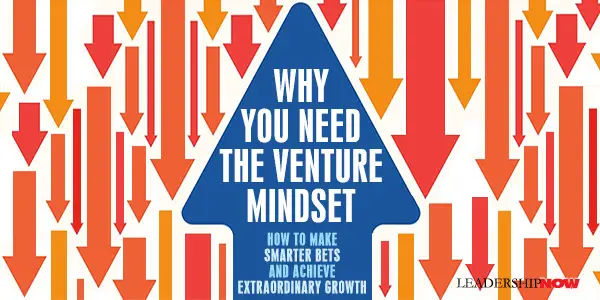
WITH uncertainty as a given, we need to approach what we do with a different mindset. Innovation is key to sustainability. The Venture Mindset offers a way to rethink your decision-making process. Ilya Strebulaev conducted the largest survey of VC investors, held hundreds of interviews, and collected what became the largest database of unicorns and unicorns-to-be and their founders. This search revealed many practices of VCs. Together with a venture builder Alex Dang they translated these learnings into practical lessons for traditional organizations and present them in The Venture Mindset. So, what is the Venture Mindset? The Venture Mindset is a new mental model where failure is a must, due diligence is put on its head, dissent is encouraged, ideas are rejected in their myriads in search of a single winner, plugs are pulled, and time horizons are extended. Here are the nine key aspects of the Venture Mindset, the most important guiding principles: Home Runs Matter, Strikeouts Don’t VCs worry more about errors of omission than they do about errors of commission. Most organizations get that turned around. The concern is not the chance of failure but the risk of missing out on the possible success. “The goal is not to win each time. The goal is not to miss the opportunity to win big at least once.” That means that you have to experiment and be comfortable with accepting failure. Every decision made will not be a win. To win in the end, “you need to be making bolder, riskier plays than you think” without betting the farm. Have more than one bet. It is important, too, to weed out your portfolio of ideas and focus on the most promising. “Too many ideas may distract and disorient the management.” Get Outside the Four Walls Work giving consideration for what is happening outside your organization. “Corporate decision makers have lots of people and resources at their disposal within their four walls. As a result, project ideas arise from what is available within the organization.” Source ideas and deals from outside and from unusual places. Go wide. This inability to source deals from outside the four walls, and to do so quickly, is one of the main reasons why innovation in so many companies is stifled. The pipeline of ideas inside your four walls is simply not big enough. The challenge is often not a lack of resources or smart people, but of a critical mass of ideas or too great a similarity between those ideas. Too often, organizations select initiatives from a small number of internally available options. In an uncertain environment, you need to be more curious. Prepare Your Mind When deciding to invest or move forward, VCs take a red-flag approach. They ask, “Why don’t I want to invest?” “VCs reduce the seemingly inordinate complexity of deal selection by searching for a decisive reason to reject an opportunity rather than advancing it to the next stage of consideration.” What is the way out of this idea? The reasons to go or no-go become obvious when you have prepared your mind to see them. “VCs rely on their pattern recognition skills, developed through numerous meetings with entrepreneurs and hundreds of hours spent flipping through pitch decks and industry studies and connecting the dots in the vague universe of startup facts and outcomes. It may seem, even to them, like a gut decision, but it has been foreshadowed by a long period of tireless effort.” Pattern recognition happens when you back off and take the 10,000-foot view. Say No 100 Times Say no more but thoughtfully. Consider many ideas, but funnel each idea through a funnel or criteria. Most will not make the first stage or cut. Those that do keep working them down through the funnel to identify the best idea. The authors advise: “To avoid lemons, evaluate more cars! Expand your idea and become disciplined about how you go through it, using different criteria at each stage.” Bet on the Jockey The team is key. The human element matters. VCs distinguish between “startup failures” and “founder failures.” VCs “are unhesitant to keep betting on the founders if they determine that the was not because of the founders.” Execution matters. “VCs know that ideas are a dime a dozen; execution of the idea makes all the difference.” Venture capitalist Georges Doriot advised, “Always consider investing in a grade A man with a grade B idea. Never invest in a grade B man with a grade A idea.” When designing an intrapreneurship culture, keep in mind: “Internal startups are run by highly motivated lean teams, without clear supervision from above, yet with tacit support and broad orientation of direction.” Too many traditional organizations hope that a single person from a large tech company can make the difference. A single person cannot. You need a team. By bringing multiple people with a new mindset in, you can kickstart innovation. Innovation is a team sport indeed. Agree to Disagree Be wary of consensus. When uncertainty is high, and there are many unknowns, consensus is a danger and often biased. “People compromise, converge, and seek consensus.” For stability, go for consensus; for breakthroughs, rely on the VC mindset way, VCs are not consensus seekers. They love arguing, fighting for their view of the future, listening carefully to others across the table, and kicking ideas around. The majority often rules, but that doesn’t mean the majority is right. Seek disagreement. Replace the need to be right with the satisfaction of discovering the truth. Get junior team members to talk first before seniors can tilt the discussion in a specific direction. Assign a devil’s advocate. You need those in the group who are “ready to dissent, disobey, stick to their views, or rebel against the others.” (This describes many entrepreneurs.) Remember, “silence in the room does not mean consent; rather, it is a strong sign of potential disaster.” Double Down or Quit Keep your options open. “To win in the long run, you must be flexible and ready to change your mind every time you collect more information.” We get attached to our decisions. “Our human nature resists reversing course and cutting our losses, even in life-or-death situations—and especially if we think we are so close to being on top of the world. Inexperienced players don’t fold frequently enough. We simply want to be right—even though we already suspect that we were wrong.” Always avail yourself of an unbiased perspective. Make the Pie Bigger VCs know that everyone who shares the pain must share in the gain. “The Venture Mindset solves the principal-agent problem by making everyone a shareholder. Instead of looking for ways to get a larger piece of the pie, everyone is busy growing the pie. Imagine that you are the founder of a very successful startup. How much would you own when your company hits an all-important IPO milestone? When we disclose the average percentage, many are surprised. Only 15 to 20 percent of the shares are typically left for all the cofounders. The founders of Lyft, Box, and Pandora kept only 6 percent, 4 percent, and 2 percent, respectively. Why would people accept such arrangements? Because VCs and founders of VC-backed companies prefer a smaller slice of a larger pie rather than the other way around. Great Things Take Time Think long-term. The changes coming will not happen in a single budget cycle. These are long-term trends and must be considered with long-term thinking and planning. Patience and long-term thinking free the mind from unnecessary limitations and push us to think about what might happen to the world in five, ten, or fifteen years. They force us to look beyond day-to-day routines. Extend your horizon and focus on the journey and not the final destination. Adopting a Venture Mindset begins with people and their mindset. Experiment with small bets. Start with a current issue and consider ways to break the status quo. What might be done? 
Posted by Michael McKinney at 05:53 PM
06.06.24

Leading Thoughts for June 6, 2024
IDEAS shared have the power to expand perspectives, change thinking, and move lives. Here are two ideas for the curious mind to engage with: Garret Kramer on insight versus willpower: “Insight is infinitely more powerful than willpower. Actually, insight, or having a new idea and/or a change of heart, erases the need for strength or force of will of any kind.” Source: Stillpower: Excellence with Ease in Sports and Life Bob Seelert on asking what’s right: “When people come into an underperforming company, they often start by asking themselves, “What’s wrong?” This is the opposite of what they should do. In my experience, the best starting point is to ask, “What’s right?” Most enterprises that prosper do so for good reasons, and these reasons form the foundation from which you can and must build a successful company. Taking the best of the past, and linking it to the present and desired future is the most dynamic way to build a business.” Source: Start with the Answer: And Other Wisdom for Aspiring Leaders Look for these ideas every Thursday on the Leading Blog. Find more ideas on the LeadingThoughts index.
Posted by Michael McKinney at 09:31 AM
06.01.24

First Look: Leadership Books for June 2024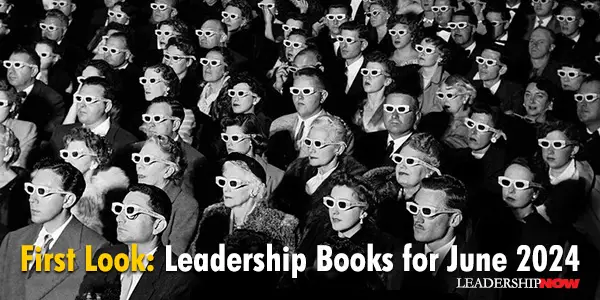
HERE'S A LOOK at some of the best leadership books to be released in June 2024 curated just for you. Be sure to check out the other great titles being offered this month.
In the bestselling The Signal and the Noise, Nate Silver showed how forecasting would define the age of Big Data. Now, in this timely and riveting new book, Silver investigates “the River,” the community of like-minded people whose mastery of risk allows them to shape—and dominate—so much of modern life. These professional risk-takers—poker players and hedge fund managers, crypto true believers and blue-chip art collectors—can teach us much about navigating the uncertainty of the twenty-first century.
In Good Judgment, Dr. Davis explains what the science of personality is and how it works, and how all of us can use it to improve our working relationships, careers, and lives. Whether you’re a novice manager looking to hire your first assistant, a board member in need of the ideal CEO, an angel investor trying to choose between two different startups, or a new parent selecting a pediatrician, understanding the science of personality and how to utilize it is the key to exercising good judgment—at work and in life.
Robert Roncska offers insights into the transformation of positive cultures that turned sour and negative cultures that became renowned. When he assumed command of the USS Texas, the ship ranked at the bottom of its squadron and faced recurring safety issues. Through innovative strategies, he successfully transformed the culture, propelling his submarine's ranking and retention from last place to first place in the Pacific Fleet within a remarkable two-year period. Starting with a loving and people-centric approach, Roncska laid the groundwork of trust, standards, and purpose. In this book, he presents a roadmap that leaders can adapt to any industry, empowering readers to create high-quality relationships and elevate their organization's performance beyond expectations.
When you put learning at the center of everything you do, you grow your career, your leadership, your relationships, and your joy and fulfillment in life. But even for people who are naturally curious and interested in solving problems, being an effective learner who can turn their learning into action takes insight and practice. With infectious enthusiasm and optimism, David Novak shows you how to master active learning. This compilation of wisdom and practical habits from Novak's life and from some of the most successful leaders in the world—CEOs from many industries, military and political leaders, sports greats, experts, and coaches—is your active-learning practice manual. Chapter by chapter, Novak and his all-star roster of leaders share how they've climbed to the highest levels in their fields.
The AI transformation is underway, but where are the leaders who will ensure their companies implement AI successfully and responsibly? Up until now, leaders have largely ceded their role in the AI transformation, pushing strategy formulation out to tech teams and leaving investment decisions to groups that don't have a full view of the organization or its goals. A generation of AI transformation failures awaits if leaders don't connect their use of AI to their strategies. This book helps leaders take control of the wildly rapid deployment of AI across organizations. Clearly and concisely, it focuses on the nine actions leaders need to take in order to successfully preside over the transition to a more AI-centric future that will lead to growth for all—companies and workers—and avoid the kinds of mistakes that author David De Cremer has seen many early adopters make.
The Gouge, in military parlance, is what you really need to know in order to be smarter than the situation you are in. As a US Navy SEAL, who became a Vice Admiral, Bob Harward lived by the Gouge and used it as a guiding principle for leadership and day-to-day life. More specifically, his success in his military and corporate careers was predicated on the people who worked with him, and for him. Now, he is sharing it with the world. In this book, he uses life stories to illustrate how anyone can use the Gouge, not only for their own well-being but also for any organization or community. At its foundation, it is your personal contract with people and humanity. In this book, Harward boils all of this down into the Gouge philosophy and its key ingredients: on how to move yourself and the people around you forward, using the best information and experienced based knowledge, so that you too can live by the Gouge.
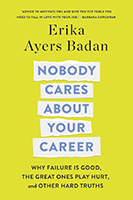 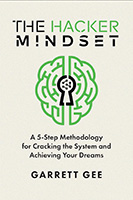 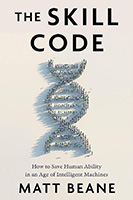 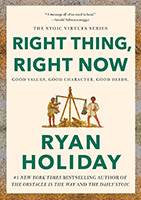
“Miss a meal if you have to, but don't miss a book.” — Jim Rohn
Posted by Michael McKinney at 08:15 AM
|
BUILD YOUR KNOWLEDGE


How to Do Your Start-Up Right STRAIGHT TALK FOR START-UPS 
Grow Your Leadership Skills NEW AND UPCOMING LEADERSHIP BOOKS 
Leadership Minute BITE-SIZE CONCEPTS YOU CAN CHEW ON 
Classic Leadership Books BOOKS TO READ BEFORE YOU LEAD |
|